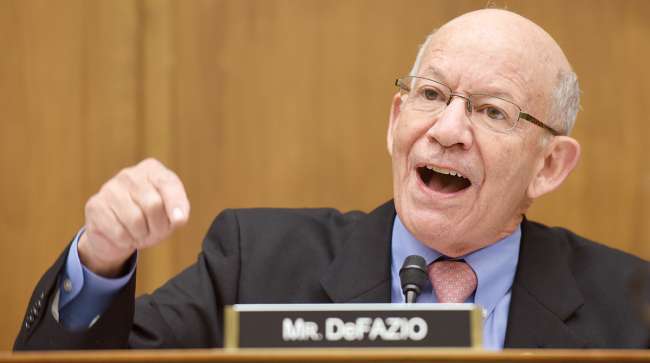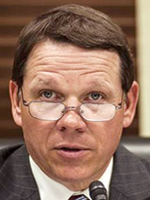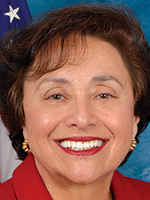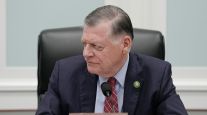Senior Reporter
House Democrats, Now the Majority, Will Push Infrastructure Funding, Oversight Agenda in 2019

A long-term infrastructure funding measure and increased oversight of the Trump administration will be priorities the new Democratic leadership in the U.S. House intends to pursue during the next two years, the incoming chairman of the transportation panel told reporters Nov. 7.
Democrats gained control of the House of Representatives for the first time in eight years in the midterm elections, and incoming Transportation and Infrastructure Committee Chairman Peter DeFazio (D-Ore.) expressed optimism about advancing robust infrastructure legislation. The current highway authorizing law expires in 2020.
President Donald Trump was unable to advance a 10-year, $1.5 trillion infrastructure plan this year with his party in control of the legislative branch. For the White House to be successful next year, DeFazio said Trump and his officials will need to abandon their proposal, which relies on private-sector investments, and consider federal government-backed accounts to fund infrastructure.
Addressing reporters at the White House on Nov. 7, Trump said infrastructure policy would be an area where he could work with Democrats, and DeFazio said he believes Trump is sincere.
“I think there’s going to be a lot of recalibration at the White House after this election,” DeFazio said. “Hopefully, they’re going to bring on-board someone to shepherd through and support the president’s view, which is real investment and real infrastructure instead of fake investment in privatized infrastructure.”
Democrats will have an infrastructure plan that aims to modernize surface transportation and boost funding for projects of regional significance and which emphasizes resilience to severe weather, DeFazio explained.
“We’re … going to build for the long term. I intend to have incentives for states to build projects like bridges that will have a 100-year lifespan,” DeFazio said, adding that he would collaborate with colleagues on the tax-writing committee to identify direct funding sources for the plan.
Infrastructure projects are backed primarily through the Highway Trust Fund, which relies on revenue from federal fuel taxes. The 24.4-cent-per-gallon diesel tax and 18.4-cent-per-gallon gas tax are insufficient to ensure the fund’s long-term solvency.

Graves
Besides infrastructure, DeFazio also wants the committee to maintain oversight of transportation funding programs and examine potential conflicts of interest across the administration.
Ready to help DeFazio is Rep. Sam Graves (R-Mo.), chairman of the Highways and Transit Subcommittee and a candidate for the ranking member post on the panel.
“I have a clear vision for an improved transportation network and the experience to accomplish big things. I look forward to presenting my vision for our transportation network to our conference,” Graves said. Republicans are expected to appoint key committee posts in the coming weeks.
House Majority Leader Kevin McCarthy (R-Calif.) recently announced his desire to take over as minority leader. The chamber’s current minority leader, California Democrat Nancy Pelosi, intends to pursue the speakership.
Pelosi agreed with DeFazio that infrastructure funding is a policy area where Democrats and Republicans can find common ground.
“I hope that we can achieve that,” Pelosi told reporters on Nov. 7. “That issue has not been a partisan issue in the Congress of the United States.”

Lowey
On the funding side, Rep. Nita Lowey (D-N.Y.), who has opposed trucking-centric provisions in transportation legislation, is expected to take control of the Appropriations Committee.
Across the Capitol, Republicans maintained their Senate majority, and Sen. Mitch McConnell intends to remain as majority leader. He, too, sounded hopeful about infrastructure.
“The one issue Leader Pelosi and I discussed this morning is — where there could be a possible bipartisan agreement — would be something on infrastructure,” the Kentucky Republican said Nov. 7. Senate Minority Leader Chuck Schumer (D-N.Y.) shared this sentiment.
Freight stakeholders such as American Trucking Associations and the U.S. Chamber of Commerce applauded the calls for bipartisan infrastructure measures.

Sullivan
“We see this as good timing if Congress and the president can come together,” said Bill Sullivan, ATA’s executive vice president of advocacy. “Everybody knows that we need to invest in infrastructure, but they just haven’t hit that magic moment that Congress at the federal level is willing to do it. And they sort of left it to the states, and we think the time is good.”
Last year, ATA proposed the Build America Fund, which would generate about $340 billion over 10 years through a built-in, 20-cent-per-gallon fee on transportation fuels.
The Chamber of Commerce also has called on transportation leaders to increase federal fuel taxes to ensure the Highway Trust Fund’s solvency.
“The chamber’s plan for infrastructure reform includes a long-term funding solution through the fuel tax,” Ed Mortimer, the chamber’s executive director for transportation infrastructure, told Transport Topics. “We also believe that increased private investment should be part of the solution. We welcome other proposals and ideas for sustainable funding.”
Senate leaders have yet to announce committee assignments for the next Congress. However, the makeup of the Senate’s trucking policy panel is expected to change, senior aides and congressional observers told TT.
Commerce Committee Chairman John Thune (R-S.D.) will likely ascend in leadership, with Mississippi Sen. Roger Wicker (R) a possible successor. Wicker has opposed truck size-and-weight provisions.
The committee’s ranking Democrat, Florida Sen. Bill Nelson, is caught in a re-election battle with Republican Gov. Rick Scott. That contest could go to a recount. A Nelson defeat could clear the way for Sen. Maria Cantwell (D-Wash.) to take the ranking member role.




